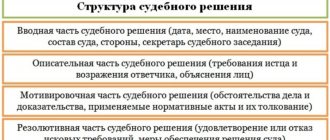It is easier to obtain a court decision than to actually implement it. Often the plaintiff is forced to run after the defendant and the bailiffs for years in order to achieve the fulfillment of his legal demand. And if the debt can still be collected somehow (for example, by foreclosure on property), then what about forcing the defendant to do something or, conversely, to refrain from specific actions? For example, if a decision is made on the defendant’s obligation:
- transfer documents (relevant for an LLC when changing the general director)
- eliminate deficiencies in the work performed (a common problem in construction disputes),
- demolish the unauthorized building (neighbors often violate SNiPs),
- vacate the land,
- enter into a contract,
- or stop carrying out an activity if it creates a danger, etc.
There are a number of mechanisms for enforcement of court decisions , for example:
- enforcement proceedings with associated costs for the defendant (enforcement fees and fines),
- fines for failure to comply with an arbitration court decision (for citizens - up to 2,500 rubles, for companies - up to 100,000 rubles),
- criminal liability.
However, as practice shows, these mechanisms are not always effective . The defendant will pay a fine, the bailiff will “lose” the enforcement proceedings, the investigator will “not see” the signs of a crime... And now the plaintiff is left alone with his problem. What will force the defendant to comply with a court decision if there is no liability or it is minimal? Will he do something if it requires significant costs or if he has to endure some inconvenience?
What is more profitable for the former director - not to hand over the documents to the new one and pay an enforcement fee of 5,000 rubles, or to hand over the documents and wait for a claim for damages? The answer is obvious.
For failure to comply with what requirements can a court penalty be collected?
It can only be recovered for violation of civil obligations. Their list is quite wide, some were listed above. But there is a list of cases for which it will not be possible to collect a judicial penalty. These include:
- administrative disputes,
- labor,
- pensions,
- family from personal non-property relations between family members,
- disputes related to social support.
Payment of a court penalty will not relieve the defendant from enforcing the court decision. Interest on a debt for a penalty cannot be recovered. But in addition, the plaintiff may demand compensation for damages.
Inquiry about the progress of enforcement proceedings
One of the easiest ways to make sure that the bailiffs are doing their job is to send them a statement asking them to provide information about the state of the proceedings, the measures taken to find the debtor and ensure repayment of the debt.
All participants in the process, both individuals and legal entities and their representatives, can send such a request. The request form is available on the service portal. You can bring it in person or send it through your account on the government services website.
The application must indicate what information you need to know about the case: for example, whether efforts have been made to find the debtor, whether there is information about his property, whether property and accounts have been seized or secured, whether the debtor’s place of work is known, whether it was possible to collect property that was reported to the bailiffs, if not, then why, and so on.
According to the internal regulations adopted by the Ministry of Justice for the bailiff service, consideration of this request cannot exceed thirty days.
If a response has not been received after the expiration of this period, this may be grounds for filing a complaint against the bailiffs.
It is worth noting that collectors can also do everything possible to assist the bailiffs in collecting debt from the debtor: provide all known information, respond to requests, stay in touch, and so on.
Is it possible to recover astrent for the period that has already passed after the decision has entered into force?
Yes it is possible.
Let me give you an example. In 2014, the Company won a claim against the Administration to force it to conclude an agreement. The defendant did not comply with the decision. In 2015, the Company filed an application to collect a judicial penalty for waiting for the execution of the decision - the starting point was the next day after the consideration of the case in the appellate instance. The court satisfied the demand and awarded a penalty at the rate of 2,000 per day until the filing of the application, and after - 3,000 rubles for each day of delay (see the resolution of the AS UO dated May 12, 2016 in case No. A60-44688/2013).
The process of executing a court decision: working with bailiffs
After the court decision comes into force, you receive a writ of execution. Over the next three years, you can present this document to the territorial department of the Federal Bailiff Service, which is responsible for enforcement proceedings. Please note that you need the territorial department at the place of residence (place of registration of the organization) of the defendant, not the plaintiff. If you present a writ of execution more than three years later, the defendant has the right not to execute the court decision due to the expiration of its statute of limitations.
Subject to the deadlines prescribed by law, enforcement proceedings in your case should begin no later than 3 days. However, in practice these deadlines are almost never met. The fact is that bailiffs are even busier than judges.
In order to begin the process of initiating enforcement proceedings, you need to submit the following documents to the bailiff service:
- writ of execution (original);
- a statement to commit certain actions against the defendant;
- details of your bank account (if the claim was about the collection of funds).
In addition, lawyers recommend that you first make a copy of the writ of execution and, when submitting an application, ask to have a stamp on it stating that your documents have been accepted. After three days from the date of filing the application, call your territorial bailiff service and find out whether enforcement proceedings have been launched on this court decision.
The procedure for executing a court decision begins with the defendant being asked to perform all necessary actions on a voluntary basis within a certain period of time.
The bailiff also warns the defendant of penalties if he refuses to comply with the court decision within the established time frame. In this case, the defendant is charged an enforcement fee (in the amount of 7% of the value of the recovered property or funds) and the costs of carrying out enforcement actions in favor of the bailiff service.
According to Article 36 of the Law “On Enforcement Proceedings”, in order to voluntarily execute a court decision, the defendant in most cases is given 2 months. But it happens that the defendant must immediately execute the court decision. Article 221 of the Code of Civil Procedure of the Russian Federation lists these cases:
- payment of alimony;
- reinstatement at work;
- accrual of wages that were delayed by the enterprise;
- inclusion of a citizen of the Russian Federation in the list of voters or candidates for an elective position.
If the claim was about monetary demands and the debtor refuses to comply with the court decision voluntarily, then the bailiff has the right to check his property status. First of all, the debtor's accounts are checked. If the status of the defendant’s account allows the debt to be paid, then the funds, at the request of the bailiff, are written off by the bank in favor of the plaintiff.
The main requirement when implementing this process: the defendant should not be left without a livelihood, the organization should not go bankrupt or be unable to fulfill obligations to its other clients. To avoid such a situation, funds can be written off from the debtor’s account in parts, as it is replenished.
If the debtor does not have enough funds in the account, but has property, then in order to execute the court decision, you may require an inventory of it. The debtor is left with the property that can be classified as a necessary means of subsistence: housing (only one), the most necessary furniture and household appliances, a computer (if it is a means of earning money), etc. The rest is sold, and the proceeds are given to the defendant so that he can fully or partially enforce the judgment.
Sometimes the debtor's property status is such that it does not allow the execution of the court decision. In this case, the writ of execution is returned to the plaintiff. The plaintiff has the right to re-file the writ of execution if he learns that the debtor’s property status has changed. But this can only be done within 3 years from the date of a reasoned court decision. Thus, whether you will be able to exercise your rights after winning the trial depends both on the bailiffs and on you.
Sources:
Civil Procedure Code
Law on enforcement proceedings
How is the size of the astrent determined?
The plaintiff himself proposes the amount of the penalty, and the court decides whether it is too high.
Clause 4 of Art. serves as a guide. 1 of the Civil Code of the Russian Federation - the amount is determined on the basis of the principles of fairness, proportionality and the inadmissibility of profiting from illegal or dishonest behavior. Ultimately, the size must be such that the execution of a court decision becomes more profitable than its non-execution. At the same time, the penalty should not lead to extremely negative consequences, for example, to the ruin of the defendant. Judicial penalties can be collected in several ways:
- in a fixed amount, for example, 5,000,000 rubles and not a penny more, regardless of the period of delay (see the resolution of the AS SZO dated June 20, 2016 in case No. A56-64754/2012),
- in the form of periodic payments (see the resolution of the Supreme Court of Ukraine dated May 12, 2016 in case No. A60-44688/2013),
- in mixed form - for example, 1,000 rubles. for each day of non-execution of a judicial act, but not more than 100,000 rubles. (see the resolution of the Supreme Court of Moscow dated August 29, 2016 in case No. A40-215119/2015),
- in the form of a progressive scale - for example, with monthly indexation of +1% (see the resolution of the AS ZSO dated 04/06/2016 in case No. A27-10877/2013).
How can a debtor be restricted from traveling abroad?
The bailiff has the right to restrict the debtor from traveling outside the Russian Federation for six months if:
- the debtor is notified of the initiation of enforcement proceedings,
- the basis for recovery is a judicial act,
- the 5-day period for voluntary execution of the judicial act has expired,
- the debt exceeds 30,000 rubles (and for socially important penalties - alimony, compensation for moral damage, etc. - 10,000 rubles).
If the amount of collection is from 10,000 to 30,000 rubles, then such a measure can be applied after the expiration of two months provided for the voluntary execution of a judicial act.
If, six months after the issuance of the judicial act, the debtor has still not repaid the debt, the bailiff may re-impose a ban on leaving Russia. It is important for the collector to monitor the completion of the specified periods and remind the bailiff of the need to re-issue a resolution restricting the debtor from traveling abroad.
For other articles, comments, notes on the execution of court decisions , authored by lawyers of the INTELLECT Law Firm, see the link .
Can the defendant ask the court to reduce the fixed legal penalty for a minor delay?
Yes, but to do this, the defendant must justify the reasons for the delay, the short duration of the delay, and prove that the amount collected is disproportionate to the consequences.
For example, the court ordered the defendant to demolish the building, and for failure to comply imposed a fine of 100,000,000 rubles. The defendant began demolition on time, but the work was completed several days late. If the defendant proves that the violation of the deadline was caused by a lack of equipment, then it is likely that the court will reduce the penalty.
Types of liability for individuals
Since compliance with judicial orders is guaranteed by the state, there is also a certain responsibility for their non-compliance:
- Financial liability - in addition to the financial costs provided for by a judicial act, there is a need for additional material losses. Thus, for initiating and conducting proceedings, an enforcement fee is collected from the debtor. The enforcement fee is expressed as a percentage of the collected amount of debt and serves as a kind of compensation for the work of the official.
- Administrative liability specifically for individuals is provided for in Part 1 of Art. 17.14 Code of Administrative Offenses of the Russian Federation. The offense consists of evading the requirements of a bailiff, providing false information about one’s property status, failure to report a new place of work or study, or obtaining new sources of income. The sanction of the article provides for punishment in the form of a fine from 1 to 2.5 thousand rubles.
- Criminal liability for malicious failure to comply with a court decision is provided for in Art. 315 of the Criminal Code of the Russian Federation. It is worth noting that an ordinary citizen will not be the subject of a crime under this article. Government officials, civil servants, and employees of commercial enterprises are brought in as defendants. Maliciousness consists of repeated and deliberate violations of the requirements of the law after written warnings from the bailiff. The maximum penalty is 2 years imprisonment.
Lawyer's note: for non-property claims, liability is provided for in Art. 17.15 Code of Administrative Offenses of the Russian Federation.
However, judicial practice shows that the most common punishment is a fine of up to 200 thousand rubles. Any citizen who encounters a court decision in his daily life must strictly understand that sooner or later the judicial act will most likely be executed. So there is no particular benefit to delaying the implementation of judicial demands.



